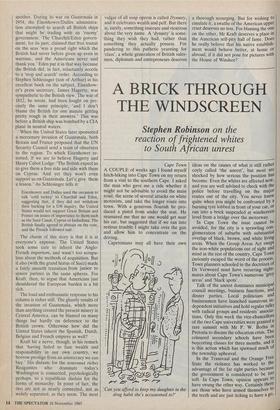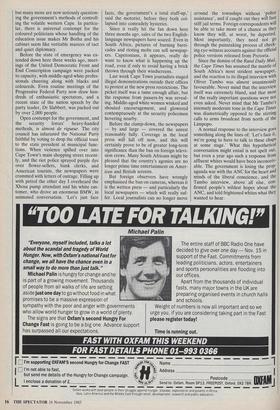A BRICK THROUGH THE WINDSCREEN
Stephen Robinson on the
reaction of frightened whites to South African unrest
Cape Town A COUPLE of weeks ago I found myself hitch-hiking into Cape Town on my return from a visit to the southern Cape. I asked the man who gave me a ride whether it might not be advisable to avoid the main road, the scene of several attacks on white motorists, and take the longer route into town. With a generous flourish he pro- duced a pistol from under the seat. He reassured me that no one would get near his car, but suggested that if we ran into serious trouble I might take over the gun and allow him to concentrate on the driving.
Capetonians may all have their own 'Can you afford to keep my daughter in the drug habit she's accustomed to?' ideas on the causes of what is still rather coyly called 'the unrest', but most are shocked by how serious the position has become. Even the whites are affected now, and you are well advised to check with the police before travelling on the major routes out of the city. You never know quite when you might be confronted by a burning tyre lobbed in front of your car, or run into a brick suspended at windscreen level from a bridge over the motorway.
In Cape Town the issue cannot be avoided, for the city is a sprawling con- glomeration of suburbs with substantial overlap of black, brown, and white living areas. When the Group Areas Act swept the non-white populations out of sight and mind in the rest of the country, Cape Town curiously escaped the worst of the process. Town planners schooled in the doctrines of Dr Verwoerd must have recurring night- mares about Cape Town's numerous 'grey areas' and 'black spots'.
Talk of the unrest dominates municipal council meetings, business functions, and dinner parties. Local politicians and businessmen have launched numerous in- dependent initiatives and hold regular talks with radical groups and residents' associa- tions. Only this week the vice-chancellors of the two Cape universities were granted a rare summit with Mr P. W. Botha in Pretoria to discuss the education crisis. The coloured secondary schools have been boycotting classes for three months, and it is this action which has spawned much of the township upheaval.
In the Transvaal and the Orange Free State the violence has worked to the advantage of the far right parties because the government is considered to be too soft. In Cape Town, opinion appears to have swung the other way. Certainly there are those who have armed themselves to the teeth and are just itching to have a go, but many more are now seriously question- ing the government's methods of controll- ing the volatile western Cape. In particu- lar, there is universal contempt for the coloured politicians whose handling of the education issue makes Mr Botha and his cabinet seem like veritable masters of tact and quiet diplomacy.
Before the state of emergency was ex- tended down here three weeks ago, meet- ings of the United Democratic Front and End Conscription campaign were packed to capacity, with middle-aged white profes- sionals cheering along with blacks and coloureds. Even routine meetings of the Progressive Federal Party now draw hun- dreds of enthusiastic spectators, and a recent state of the nation speech by the party leader, Dr Slabbert, was packed out by over 2,000 people.
Open contempt for the government, and the security forces' heavy-handed methods, is almost de rigueur. The city council has infuriated the National Party faithful by voting to drop the official toast to the state president at municipal func- tions. When violence spilled over into Cape Town's main shopping street recent- ly, and the riot police sprayed purple dye over flower-sellers, bank clerks, and American tourists, the newspapers were crammed with letters of outrage. Filling up with petrol the other day I overheard the Xhosa pump attendant and his white cus- tomer, who drove an enormous BMW, in animated conversation. 'Let's just face
facts, the government's a total stuff-up,' said the motorist, before they both col- lapsed into comradely hysterics.
Since it really hit the fan down here three months ago, sales of the two English- language newspapers have soared. Even in South Africa, pictures of burning barri- cades and rioting mobs can sell newspap- ers. Capetonians, it appears, really do want to know what is happening up the road, even if only to avoid having a brick thrown through their windscreens.
Last week Cape Town journalists staged illegal demonstrations outside their offices to protest at the new press restrictions. The picket itself was a tame enough affair, but the response from passers-by was reveal- ing. Middle-aged white women winked and shouted encouragement, and glowered contemptuously at the security policemen hovering nearby.
Before the clamp-down, the newspapers — by and large — covered the unrest reasonably fully. Coverage in the local press will fall off now, and this will certainly prove to be of greater long-term significance than the ban on foreign televi- sion crews. Many South Africans might be pleased that the country's agonies arc no longer prime time entertainment on Amer- ican and British screens.
But foreign observers have wrongly emphasised the ban on cameras, whereas it is the written press — and particularly the local newspapers — which will really suf- fer. Local journalists can no longer move around the townships without 'police assistance', and if caught out they will face stiff jail terms. Foreign correspondents will be able to take more of a chance as they know they will, at worst, be deported. Most importantly, they need not go through the painstaking process of check- ing eye-witness accounts against the official police versions released from Pretoria.
Since the demise of the Rand Daily Mail, the Cape Times has assumed the mantle of South Africa's most strident newspaper, and the reaction to its illegal interview with Oliver Tambo was almost unanimously favourable. Never mind that the interview itself was extremely bland, and that most of the really important questions were not even asked. Never mind that Mr Tambo's intensely moderate tone in the Cape Times was diametrically opposed to the stirring calls to arms broadcast from north of the Limpopo.
A normal response to the interview goes something along the lines of: 'Let's face it, we're going to have to talk to these chaps at some stage.' What this hypothetical conversation might entail is not spelt out, but even a year ago such a response from affluent whites would have been inconceiv- able. The government is losing the prop- aganda war with the ANC for the heart and minds of the liberal conscience, and the Tambo interview, above all else, con- firmed people's wildest hopes about the ANC, and told frightened whites what they wanted to hear.



































































 Previous page
Previous page